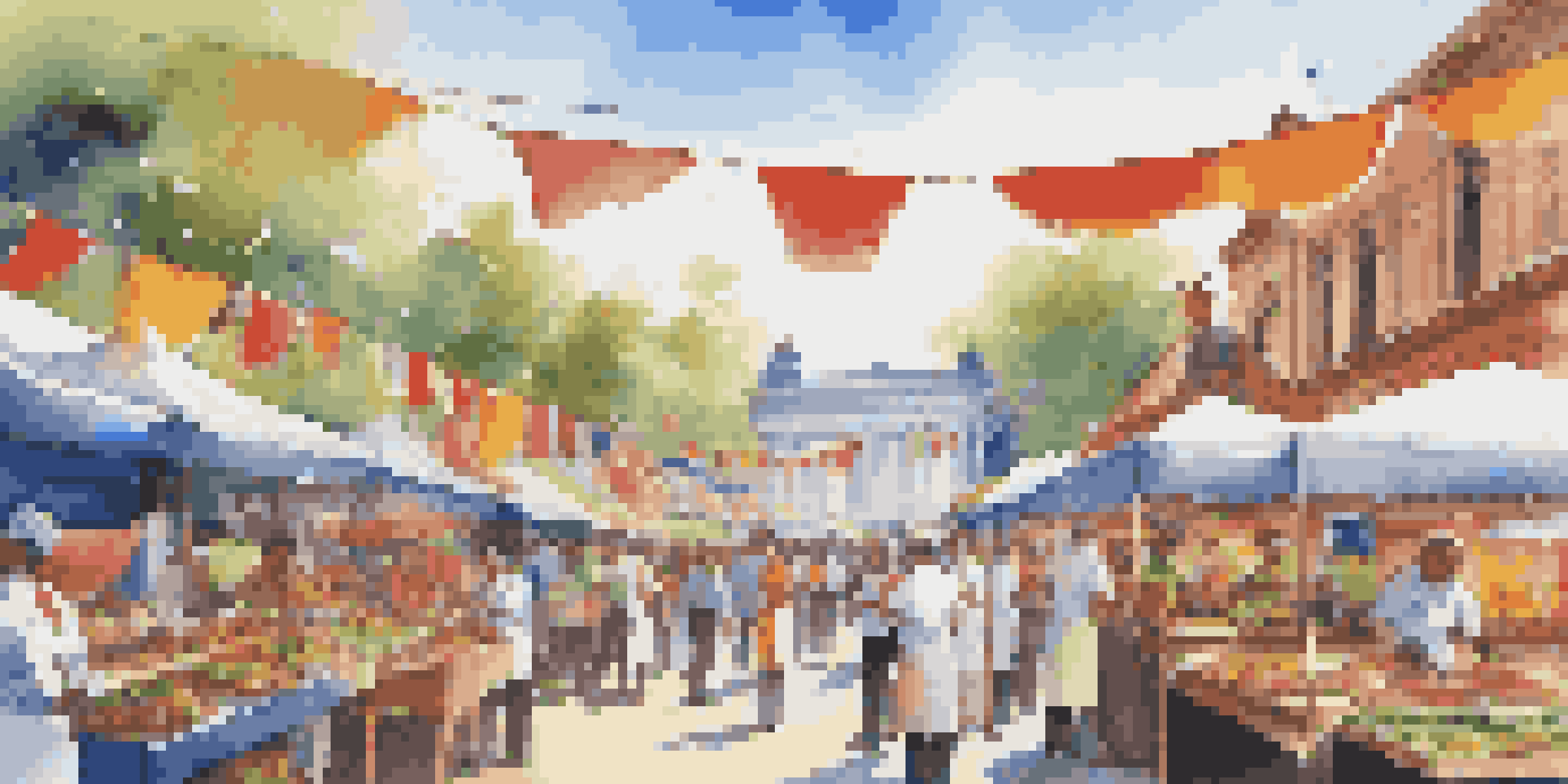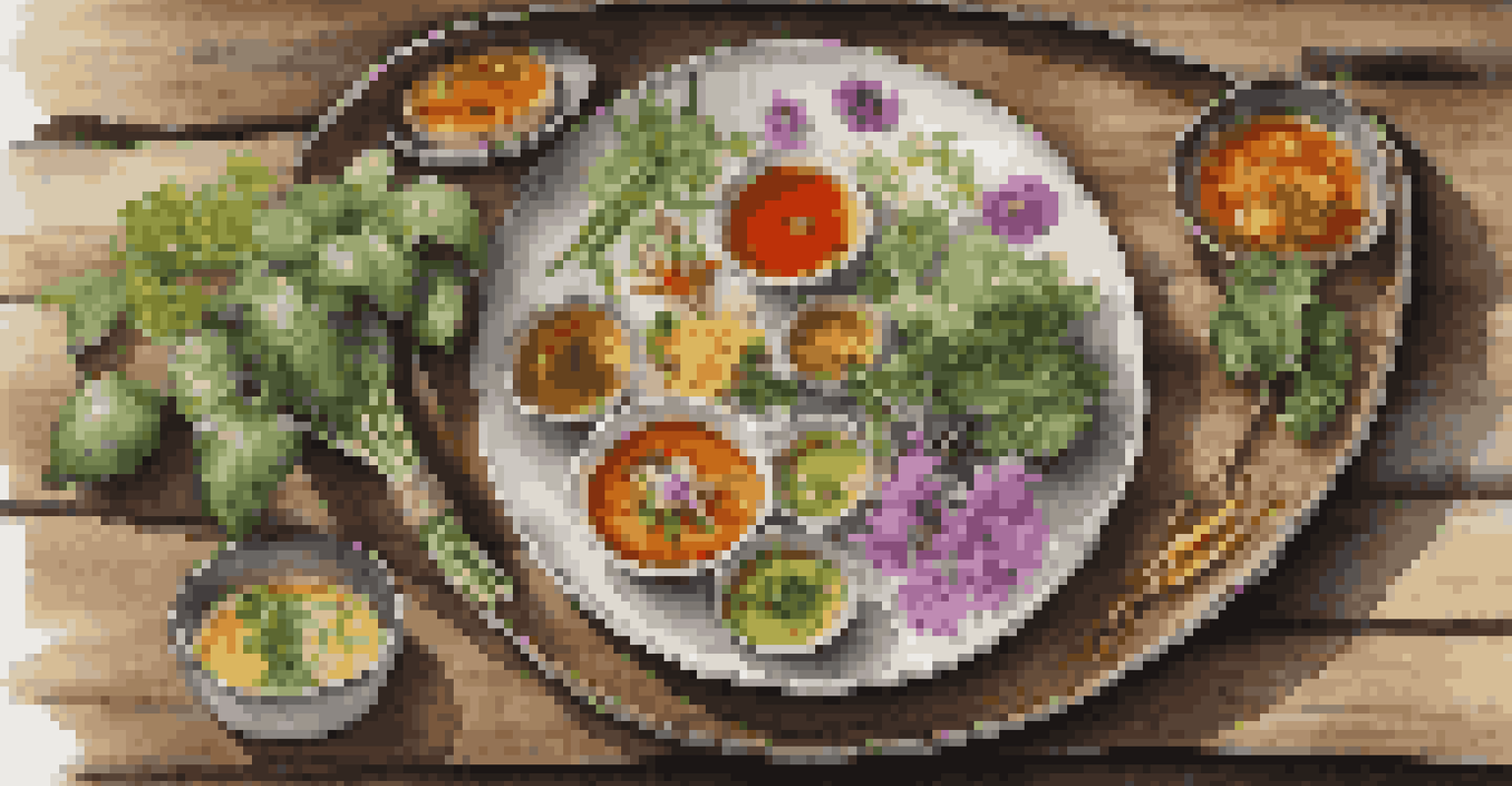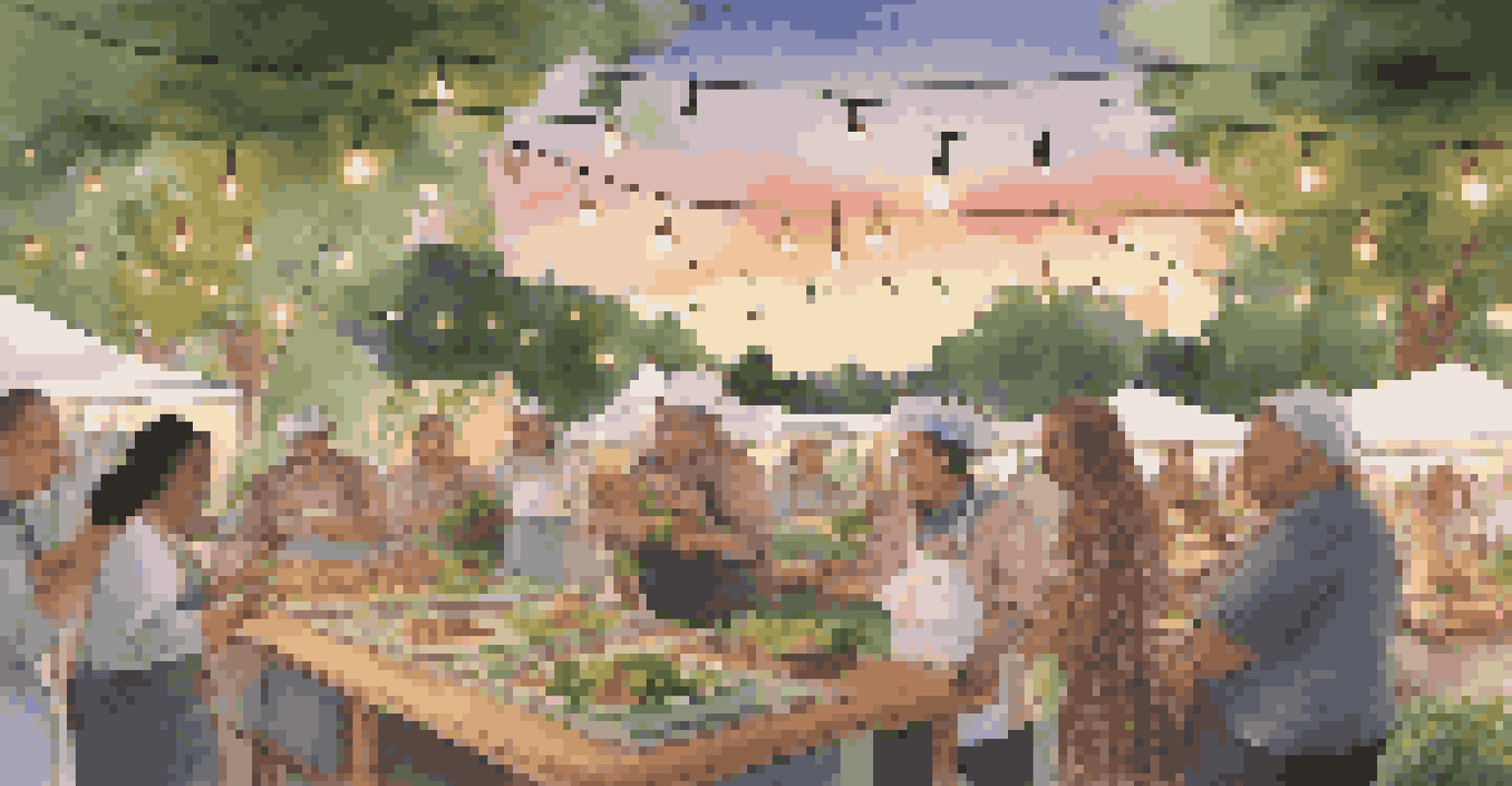Culinary Festivals: A Taste of Global Flavors and Cultures

What Are Culinary Festivals and Why Do They Matter?
Culinary festivals are vibrant celebrations dedicated to food, culture, and community. They offer a unique opportunity for people to come together and explore diverse flavors from around the world. At these festivals, local chefs, food enthusiasts, and visitors unite to share their love for cuisine, making it a melting pot of culinary traditions.
Food is our common ground, a universal experience.
These events not only highlight the art of cooking but also emphasize the importance of cultural exchange. Each dish tells a story, representing its origin and the people behind it. By participating in culinary festivals, attendees gain a deeper appreciation for the rich tapestry of global cuisines and the history woven into each recipe.
Moreover, culinary festivals often support local economies by promoting regional ingredients and businesses. This connection fosters a sense of community and pride in local food heritage, encouraging sustainable practices and the continuation of traditional cooking methods.
Exploring Iconic Culinary Festivals Around the World
Around the globe, culinary festivals showcase the uniqueness of each region's cuisine. For instance, the famous La Tomatina in Spain revolves around the playful throwing of tomatoes, but it's also a celebration of the country's agricultural bounty. Similarly, the Melbourne Food and Wine Festival in Australia attracts food lovers from all over, featuring local chefs and artisan producers.

In Asia, the Thai Food Festival draws crowds eager to experience the balance of sweet, sour, salty, and spicy that defines Thai cuisine. Each festival not only highlights food but also offers cooking demonstrations, workshops, and tastings, providing a hands-on experience for participants.
Culinary Festivals Foster Community
These vibrant celebrations unite people to explore diverse flavors and cultural traditions.
These iconic festivals serve as a reminder of the diverse culinary practices around the world, encouraging visitors to embrace and explore new flavors. By attending these events, people gain firsthand knowledge of cultural traditions, cooking techniques, and the stories behind various dishes.
The Role of Food in Cultural Identity
Food is more than sustenance; it serves as a reflection of cultural identity and heritage. Culinary festivals play a crucial role in preserving these identities, as they often celebrate traditional recipes passed down through generations. For many communities, food is a way to honor their ancestors and share their history with future generations.
The discovery of a new dish does more for the happiness of mankind than the discovery of a star.
When people come together to celebrate food, they also celebrate their shared experiences and values. This connection fosters understanding and appreciation for different cultures, breaking down barriers and building bridges among diverse communities. Culinary festivals become a space for storytelling, where each dish conveys a rich narrative.
Moreover, these festivals encourage cultural exchange, inviting attendees to sample and engage with unfamiliar cuisines. This exposure helps to cultivate an appreciation for diversity, making food a powerful tool for unity and dialogue in our increasingly globalized world.
Sustainable Practices at Culinary Festivals
As awareness of environmental issues grows, many culinary festivals are embracing sustainable practices. From sourcing local ingredients to minimizing waste, these events are making strides towards eco-friendly operations. By highlighting local produce, they not only support farmers but also reduce the carbon footprint associated with transporting food over long distances.
Moreover, many festivals are increasingly focusing on reducing single-use plastics and promoting recycling initiatives. This shift encourages attendees to be more conscious of their environmental impact while enjoying delicious food. Workshops and talks on sustainability are often included, educating participants on how they can incorporate these practices into their everyday lives.
Food as Cultural Identity
Culinary festivals preserve cultural heritage by honoring traditional recipes and shared experiences.
By prioritizing sustainability, culinary festivals are setting an example for the food industry as a whole. They show that it is possible to celebrate food and culture while also caring for the planet, inspiring both the attendees and the vendors to adopt more responsible practices.
Unique Experiences Beyond the Food
Culinary festivals offer more than just delicious food; they create unique experiences that engage all the senses. From live music and dance performances to art installations, these events provide a festive atmosphere that is both vibrant and memorable. Attendees can immerse themselves in the culture while savoring new flavors.
Workshops and cooking demonstrations are also a highlight, allowing participants to learn from skilled chefs. These interactive sessions enable attendees to pick up new skills and techniques, making them feel like part of the culinary journey. Whether it's mastering the perfect pasta or experimenting with spices, these experiences are enriching and fun.
Additionally, culinary festivals often feature competitions such as cooking contests or food challenges. These events not only showcase talent but also create excitement and camaraderie among participants. The thrill of competition adds an extra layer of enjoyment, making each festival a unique adventure.
How to Prepare for a Culinary Festival
If you're planning to attend a culinary festival, preparation can enhance your experience significantly. Start by researching the festival's lineup—know which chefs, vendors, and activities will be present. Familiarizing yourself with the featured cuisines can help you prioritize what you want to taste and experience.
It's also wise to arrive early to avoid long lines and to take full advantage of the offerings. Many festivals provide tasting portions, allowing you to sample a variety of dishes without overindulging. Make a plan to explore different booths and be open to trying new flavors, as culinary festivals are all about discovery.
Sustainability in Culinary Events
Many festivals are adopting eco-friendly practices, showcasing local ingredients while minimizing environmental impact.
Lastly, consider bringing along friends or family to share the experience. Food tastes even better when enjoyed with others, and having companions means you can try more dishes together. Documenting your culinary journey through photos or notes can also make for wonderful memories to cherish long after the festival is over.
The Future of Culinary Festivals
Looking ahead, culinary festivals are poised to evolve and adapt to changing trends and consumer preferences. As food culture continues to shift towards health-conscious options, many festivals are likely to incorporate more plant-based and organic offerings. This evolution reflects the growing awareness of sustainability and health among food enthusiasts.
Additionally, technology is playing a significant role in shaping the future of culinary festivals. From virtual cooking classes to augmented reality experiences, festivals are likely to embrace innovative approaches to engage attendees. This tech-driven shift can enhance interactive experiences, allowing participants to connect with chefs and food experts in new ways.

Moreover, as the world becomes increasingly interconnected, culinary festivals will continue to serve as vital platforms for cultural exchange. They will remain a celebration of diversity, inviting people to taste, learn, and appreciate the myriad flavors that different cultures have to offer. As we look forward to the future, culinary festivals will undoubtedly keep the spirit of exploration alive.